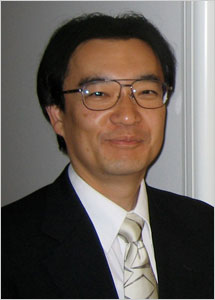Home > Press > New professor to develop smaller, more powerful devices at nanoscale
 |
| Hiroshi Mizuta Copyright: ECS |
Abstract:
A new professor in ECS will work on making smaller, more powerful computers and mobile phones a reality when the new Mountbatten Building opens next year.
New professor to develop smaller, more powerful devices at nanoscale
Southampton, UK | Posted on July 25th, 2007Professor Hiroshi Mizuta, who has joined the University's School of Electronics & Computer Science (ECS) believes that the state-of-the-art, interdisciplinary research complex facilities planned for the new £55 million University of Southampton Mountbatten Building, which is due to open in mid-2008, will allow him to carry out extensive research into nanotechnology.
‘The new clean room under construction in the building, the high level of expertise available to me and the possibility of collaboration with other strong groups such as the Optoelectronics Research Centre, and academics in engineering science, physics and chemistry, will allow me to develop more hybrid devices and systems,' he said.
Professor Mizuta made a major contribution to the field when he and his colleagues developed a high-speed single-electron memory and a new memory device called PLEDM TM (Phase-state Low Electron-number Drive Memory), which is a single chip which enables instant recording and accessing of a massive amount of information while consuming very little power, when he was a laboratory manager for Hitachi in Cambridge.
At ECS, Professor Mizuta plans to combine the conventional top-down approach to silicon nanoelectronics with a bottom-up approach which will enable him to introduce atomically-controlled nanoscale building blocks such as nanodots, nanowires and nanotubes to make his unique nanodevices.
‘We now need a paradigm shift from conventional ‘More Moore' technology to ‘More than Moore' and ‘Beyond CMOS'(complementary-metal-oxide-semiconductor) technologies. I believe that if we adopt unique properties of well-controlled nanostructures and co-integration with other emerging technologies such as NEMS, nanophotonics and nanospintronics, we can develop extremely functional information processing devices, faster than anything we could ever have imagined with just conventional ‘More Moore' technologies,' he said.
####
About ECS-University of Southampton
ECS is one of 19 academic Schools in the University of Southampton. It is one of the world’s largest and most successful integrated departments of Electronics, Electrical Engineering, and Computer Science. It offers a wide range of undergraduate degrees and taught Masters programmes, and has a large and thriving Graduate School.
For more information, please click here
Contacts:
Electronics and Computer Science
University of Southampton
SO17 1BJ
United Kingdom
Tel: +44 (0)23 8059 6000
Copyright © University of Southampton
If you have a comment, please Contact us.Issuers of news releases, not 7th Wave, Inc. or Nanotechnology Now, are solely responsible for the accuracy of the content.
| Related News Press |
Academic/Education
![]() Rice University launches Rice Synthetic Biology Institute to improve lives January 12th, 2024
Rice University launches Rice Synthetic Biology Institute to improve lives January 12th, 2024
![]() Multi-institution, $4.6 million NSF grant to fund nanotechnology training September 9th, 2022
Multi-institution, $4.6 million NSF grant to fund nanotechnology training September 9th, 2022
Chip Technology
![]() Lab to industry: InSe wafer-scale breakthrough for future electronics August 8th, 2025
Lab to industry: InSe wafer-scale breakthrough for future electronics August 8th, 2025
![]() A 1960s idea inspires NBI researchers to study hitherto inaccessible quantum states June 6th, 2025
A 1960s idea inspires NBI researchers to study hitherto inaccessible quantum states June 6th, 2025
![]() Programmable electron-induced color router array May 14th, 2025
Programmable electron-induced color router array May 14th, 2025
Nanoelectronics
![]() Lab to industry: InSe wafer-scale breakthrough for future electronics August 8th, 2025
Lab to industry: InSe wafer-scale breakthrough for future electronics August 8th, 2025
![]() Interdisciplinary: Rice team tackles the future of semiconductors Multiferroics could be the key to ultralow-energy computing October 6th, 2023
Interdisciplinary: Rice team tackles the future of semiconductors Multiferroics could be the key to ultralow-energy computing October 6th, 2023
![]() Key element for a scalable quantum computer: Physicists from Forschungszentrum Jülich and RWTH Aachen University demonstrate electron transport on a quantum chip September 23rd, 2022
Key element for a scalable quantum computer: Physicists from Forschungszentrum Jülich and RWTH Aachen University demonstrate electron transport on a quantum chip September 23rd, 2022
![]() Reduced power consumption in semiconductor devices September 23rd, 2022
Reduced power consumption in semiconductor devices September 23rd, 2022
Announcements
![]() Rice membrane extracts lithium from brines with greater speed, less waste October 3rd, 2025
Rice membrane extracts lithium from brines with greater speed, less waste October 3rd, 2025
![]() Researchers develop molecular qubits that communicate at telecom frequencies October 3rd, 2025
Researchers develop molecular qubits that communicate at telecom frequencies October 3rd, 2025
![]() Next-generation quantum communication October 3rd, 2025
Next-generation quantum communication October 3rd, 2025
![]() "Nanoreactor" cage uses visible light for catalytic and ultra-selective cross-cycloadditions October 3rd, 2025
"Nanoreactor" cage uses visible light for catalytic and ultra-selective cross-cycloadditions October 3rd, 2025
Appointments/Promotions/New hires/Resignations/Deaths
![]() Leibniz Prize winner Professor Dr. Oliver G. Schmidt moves to Chemnitz University of Technology: President Professor Dr. Gerd Strohmeier refers to an 'absolute top transfer' September 10th, 2021
Leibniz Prize winner Professor Dr. Oliver G. Schmidt moves to Chemnitz University of Technology: President Professor Dr. Gerd Strohmeier refers to an 'absolute top transfer' September 10th, 2021
![]() JEOL USA Welcomes New Managing Director, Hidetaka Sawada April 19th, 2021
JEOL USA Welcomes New Managing Director, Hidetaka Sawada April 19th, 2021
![]() The National Space Society Remembers Ben Bova : NSS Mourns the Loss of a Visionary NSS Leader December 2nd, 2020
The National Space Society Remembers Ben Bova : NSS Mourns the Loss of a Visionary NSS Leader December 2nd, 2020
|
|
||
|
|
||
| The latest news from around the world, FREE | ||
|
|
||
|
|
||
| Premium Products | ||
|
|
||
|
Only the news you want to read!
Learn More |
||
|
|
||
|
Full-service, expert consulting
Learn More |
||
|
|
||








